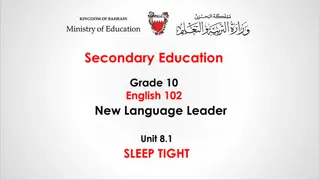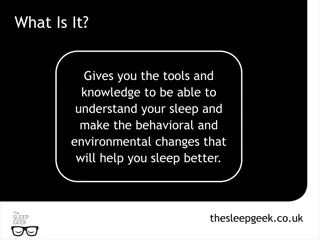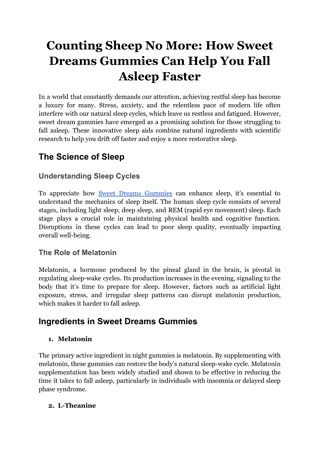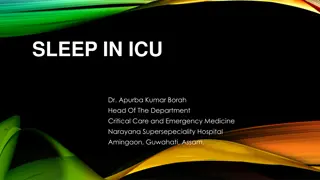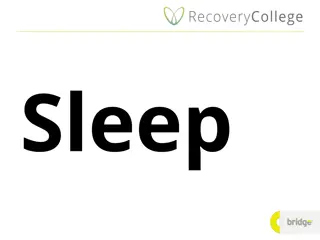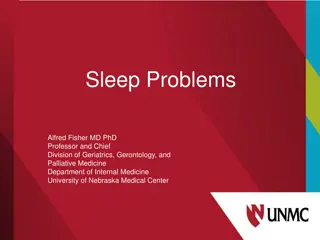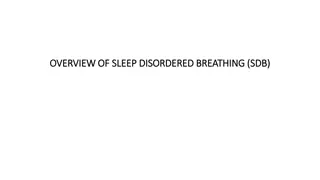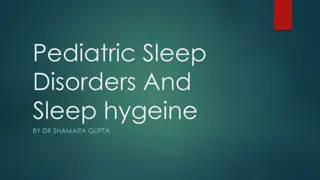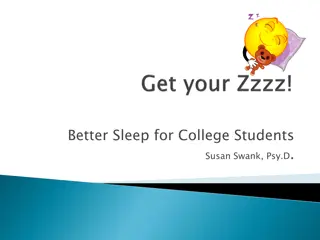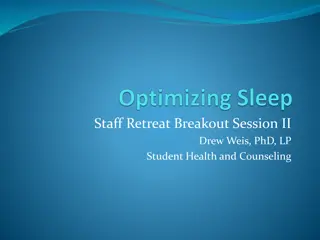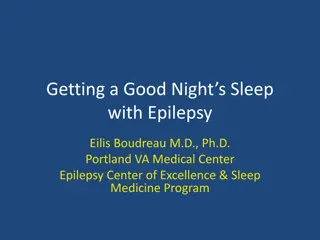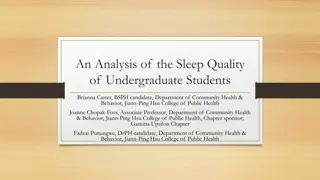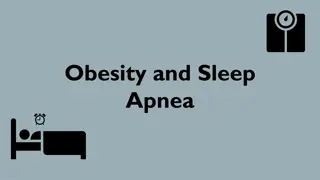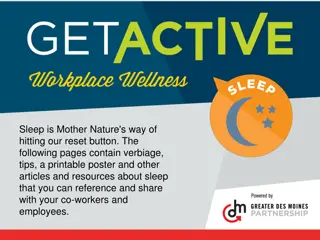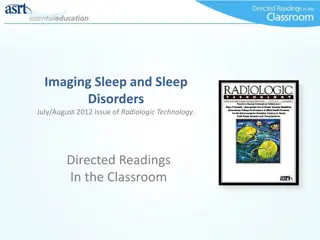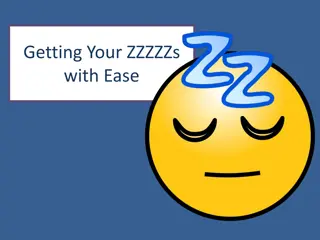Understanding the Impact of Sleep Deprivation on Legal Proceedings
Explore the intersection of forensic science, legal defense, and jury deliberation in the context of sleep deprivation. Recent research highlights the parallels between the effects of sleep deprivation, cognitive fatigue, and alcohol on decision-making and performance in courtrooms. The implications of impaired judgment due to lack of sleep are crucial in ensuring fair trials and upholding the principles of justice.
Download Presentation

Please find below an Image/Link to download the presentation.
The content on the website is provided AS IS for your information and personal use only. It may not be sold, licensed, or shared on other websites without obtaining consent from the author. Download presentation by click this link. If you encounter any issues during the download, it is possible that the publisher has removed the file from their server.
E N D
Presentation Transcript
Whiskey in the Courtroom Evolving Trends in Forensic Science NC Indigent Defense Services and the Duke Law Center for Criminal Justice and Professional Responsibility
Whiskey in the Courtroom The Application of Sleep Deprivation Research on Jury Deliberation Theresa Newman and Pate Skene
THE INGREDIENTS A judge with a Friday commitment Multiple warnings, including we WILL be done on Thursday Early start Thursday Close of State s case at 5:00 p.m. Close of Defense s case about 8:45 p.m., followed by closing arguments/jury instruction Start of jury deliberation about 10:30 p.m. Guilty verdict on all counts (murder, arson, robbery) at 3:01 a.m.
court starts state rests verdict about 6:30 a.m. 10:38 8:30 5:00 p.m. 3:01 a.m. jurors wake up jury retires 20 hours
THE LEGAL CLAIM Newly discovered evidence claim Legal right to a neutral and impartial jury Which discharges duties honestly, intelligently and free from the influence and dominion of impairing conditions (1895 N.C. case) Jurors must be able to discuss evidence, and to properly consider its weight and the effect of their conclusions (id.) New science demonstrates the jurors were significantly impaired by the effects of fatigue and sleep deprivation
THE SCIENCE Equivalence of sleep deprivation/fatigue and alcohol in degrading psychomotor performance (1997-2005) Extends to cognitive performance and racial bias Impact in aviation/transportation/operations
THE SCIENCE Sleep deprivation and cognitive fatigue are equivalent to alcohol in impairing psychomotor performance Lamond and Dawson. 1999. J. Sleep Research 8: 255-262. doi 10.1046/j.1365-2869.1999.00167.x
THE SCIENCE Cognitive impairment late at night is separate and synergistic with fatigue and sleep deprivation Circadian rhythm of impairment Van Dongen and Dinges. 2003. J. Sleep Res. 12: 181-187. doi 10.1046/j.1365-2869.2003.00357.x
THE SCIENCE People cannot report accurately their level of impairment by sleep deprivation Self- report Actual performance Van Dongen et al. 2004. Sleep. 27: 423-433.
THE SCIENCE Impairments extend to many areas of cognitive performance and judgment J.A. Caldwell. 2008. Sleep Med. Rev. 12: 257-273.
THE SCIENCE Moderate sleep deprivation makes it more difficult to suppress racial bias Ghumman and Barnes. 2013. J. Appl. Soc. Psych. 43: E166-E178.
THE SCIENCE Moderate sleep deprivation makes it more difficult to suppress racial bias Reaction time for shoot / don t shoot Ma et al. 2013. Basic & Applied Social Psych. 35: 515-524. doi: 10.1080/01973533.2013.840630
THE SCIENCE Cognitive depletion / ego depletion model Decreased self-regulation More reliance on intuitive judgments: heuristics and biases initial impulse emotional reaction (amygdala) Less effective inhibition of these impulses: executive functions (prefrontal cortex)
THE SCIENCE Sleep deprivation selectively alters activity of brain regions involved in social judgments and decision- making Amygdala vmPFC (ventromedial prefrontal cortex) Libedinsky et al. 2011. Front. Behav. Neurosci. 5: doi: 10.3389/fnbeh.2011.00070
THE SCIENCE SUMMARY Extensive research over the last 20 years (new evidence) Convergent findings from aviation/military operations research, management researchers, sleep psychologists, neuroscience Psychomotor and cognitive effects equivalent to legal intoxication Circadian (time of day) effects separate from fatigue Affects memory, vigilance, judgment, self-regulation, rule-following, racial bias Self-assessment is NOT reliable measure of actual impairment
THE SCIENCE Impact in military/aviation/transportation operations U.S. Air Force Guidance for Scheduling Flight Missions to Avoid Fatigue in Aircrew: Generally speaking, the maximum flight duty period for any given day should fall within the range of 12 to16 h in situations where crew augmentation is not possible. When augmented crews are an option, duty days normally can extend to 16 to 24 h. U.S. Navy Guidance for Scheduling Flight Missions to Avoid Fatigue in Aircrew: Flightcrew should not be scheduled for continuous alert or flight duty in excess of 18 h. If operational tempo requires the flight time limitations to be exceeded, the commanding officer, with the flight surgeon's advice, will closely monitor and specifically clear flight personnel, commenting particularly in regard to stress level and adequacy of rest and nutrition. J.A. Caldwell. 2009. Aviation Space & Env. Med. 80: 29-59. doi 10.3357/ASEM.2435.2009


